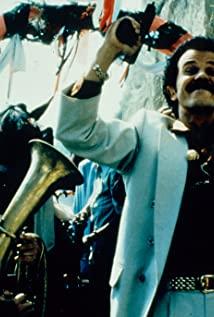After watching "Underground", I first feel that, first, I want to see Spind’s "Lily Marien" and see what makes Kusturica love "Lily Marien" so much that this episode is in the film. Many dignified record fragments in the film (in the information film of Yugoslavia being attacked by the German army, when Ma Gao sounded the air raid alarm to the underground people from time to time, in the news film of Tito's funeral). Second, go to Baidu to investigate Yugoslavia's ill-fated history of invasion and disintegration, and see what it takes to learn from the pain in order to laugh and scold a jubilant farce of magicalism.
The whole movie uses jokes that contain satire, criticism, metaphor, and irony into an exquisite lie. All the actors are in their respective positions like clowns, deliberately acting absurdly to act out an absurd story before and after World War II, but the back of the absurdity is the director’s historical reflection on the motherland and worries about the prospects of the motherland after he talks about the past and accepts the new. From the perspective of reflection and the sense of admonition, "Underground" did not degrade the depth of the ideological dimension because of the jubilation of magicalism, but because of the seemingly eclectic form and style, the spiritual value considerations became more pronounced.
Diversified attitudes should not be exclusive to entertainment patents. Culture loses its last place to live, and mass carnivals begin to create new dictatorships. The director hurriedly "knowingly committed the crime", exposing the autocratic hypocrisy and ruthlessness with popular carnivals. (The director should be a person with a carnival complex. Both the opening and the end of the film echo through the carnival, and the celebration-style dance and music rise and fall across the film.) The law of the film is that you cannot directly criticize the dictatorship of the political party, the hierarchical system of the society, and the state. Bureaucracy, so Kusturica uses the contrast between "underground" and "on the ground" to broaden his speech space. "Underground" is actually a closed space, a "city without sky." Marko is the fabrication of that lie. As the spiritual leader of a small country, he seems to have a clear sense of righteousness. In fact, the cunning only wants to make a very profitable war fortune. As the most revolutionary person in the film, Xiao Hei takes his tongue as a vow, thinking that the flames of war that have long since subsided are still raging. Here, Magao is a metaphor for the ruling party or the leading class, while the revolutionary enthusiasm for Xiaohei is a metaphor for the people. The people are deceived by the leaders, and the people are filled with indignation, but the leaders are profiteering. It seems that the instigator of "war" has not been put on the agenda of how severe and painful it is. On the contrary, it has taken the second place under the flustered proposition of Yugoslavia's self-governance.
There are endless exaggerations and ridicules with the enthusiasm of the demonic dance of the population. Even in some war scenes, mourning scenes and even torture scenes, there are uncontrollable laughs, but after the laugh, I want to sigh, when the long-term worries and immediate worries are clear in the movie. Revealing, referring to the disintegration of Yugoslavia in recent decades, the director's anxiety is not out of nothing. When faced with corruption and ignorance, most people choose to keep secrets, and the individual lines in the movie are inspiring people. For example, Marko said: "When a younger brother kills his own brother, it is a real war." People under the war may be able to unify the outside world, but the slaughter of brothers after the war becomes the biggest factor in the people's livelihood, just like the civil unrest in the country. For example, the peacekeeping force easily said to Ivan: "Yugoslavia is gone." Ivan's expression became sad and helpless. As the simplest character in the play, Ivan was in the flames of war and looked for the orangutan Sony in spite of his personal safety. The pain also became the inducement for him to kill his brother. It was precisely because of his brother Magao's deception and smuggling that he was desperate. On the one hand, he felt betrayed by his relatives. For another example, the last subtitle of the film: "This story has no ending." Kusturica was not immersed in the illusory ending of everyone's suspicion, singing and dancing. This line of subtitles seems to look forward to Yugoslavia's national power. Now look at it. Come, maybe that was the horn before the disintegration.
The director's magicalism is applied to the culmination of "underwater", and everyone has real peace under the water. Xiao Hei's son drowned in the water, but he was entangled in the water by his beautiful and dead newlywed wife. Including the last Xiao Hei seeing the phantom of his son in the well, jumping down to meet him, and then his dead wife, Magao, and Natalie came, a group of people wandering in the water happily, forgetting love and wandering. The last picnic on the outskirts was really a portrayal of bliss. He came back from the dead, Ivan no longer stuttered, Natalie’s brother was able to walk freely, and Xiao Hei no longer thought about Natalie. Everything exists in a form without contradictions and waves, and it is the superego realm pursued by idealism. The director here wants to give us a kind of peace and peace after the gunpowder smoke, and then the final subtitles remind us that we will have to endure even more wandering gunpowder smoke in the future.
Huxley said: "People use laughter instead of thinking, and they don't even know why they laugh or why they think." When dealing with laughter and thinking, Kusturica is able to combine the two into one, trying to metaphysical shame and laughter. The accusation was shocking enough to make the person in power, who had piled up a lie, bury his face in his handkerchief and cry deeply.
View more about Underground reviews











